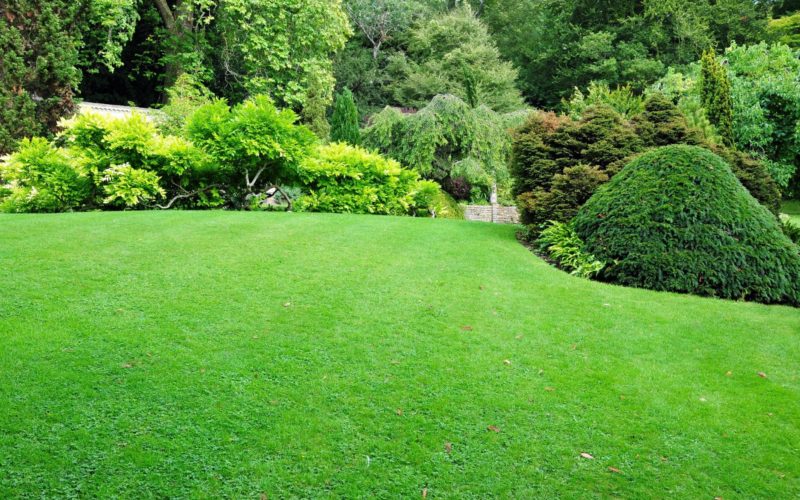Embracing green practices in lawn care not only promotes a healthier environment but also contributes to the well-being of your yard. Natural lawn care emphasizes the use of organic materials and eco-friendly techniques to nourish your lawn, ensuring it thrives without the application of harsh chemicals.

This guide will walk you through various eco-friendly solutions for maintaining a green, healthy yard. From soil management to water conservation, we’ll cover strategies that are not only beneficial for your lawn but also kind to our planet.
Contents
Soil Management
The foundation of a healthy lawn starts with soil management. By maintaining healthy soil, you are providing your grass with essential nutrients and a sturdy base to grow. Here are some eco-friendly practices for managing your soil:
Composting
Composting is the process of decomposing organic waste into nutrient-rich soil. It’s a great way to reduce food waste and provide your lawn with natural fertilizer. You can start composting by collecting kitchen scraps, leaves, grass clippings, and other organic materials in a compost bin or pile.
Aeration
Aerating your lawn involves creating small holes throughout the soil to allow air, water, and nutrients to penetrate deeper into the ground. This process helps reduce compaction and promotes healthy root growth. Using a manual or mechanical aerator is an eco-friendly way to improve your lawn’s soil quality.
Water Conservation
Conserving water not only reduces your utility bills but also decreases demands on local water sources. Here are some natural lawn care strategies for conserving water:
Rainwater Harvesting
Harvesting rainwater is a cost-effective and eco-friendly way to water your lawn. You can collect rainwater in barrels or cisterns from your gutters and use it to irrigate your lawn during dry spells.
Drip Irrigation
Drip irrigation systems deliver water directly to the roots of your plants, reducing waste and promoting deep root growth. This method is a more efficient way to water your lawn than traditional sprinkler systems.
Natural Pest Control
Maintaining a healthy balance of pests in your lawn can be accomplished naturally rather than using harmful chemicals. Here are some tips for natural pest control:
Companion Planting
Companion planting involves planting specific plants next to each other to deter pests. For example, marigolds can repel insects while attracting beneficial pollinators like bees.
Organic Insecticides
If you have a severe pest problem, consider using organic insecticides made from natural ingredients such as neem oil or diatomaceous earth. These products are safer for the environment and won’t harm beneficial insects.
Why is Lawn Care Important for a Healthy Planet?
You may be wondering, how does natural lawn care affect the environment? Here are some ways eco-friendly lawn care can benefit our planet:
Reducing Chemical Runoff
Chemicals used in traditional lawn care products can seep into groundwater and streams, causing harm to aquatic life and polluting our water sources. By using natural methods, we can reduce the risk of chemical runoff and protect our waterways.
Promoting Biodiversity
A healthy lawn with a diverse range of plants can provide habitats for beneficial insects, birds, and other wildlife. This promotes biodiversity and helps maintain balance in our ecosystem. Biodiversity is always a good route to take.
Contributing to a Greener Earth
Traditional lawn care practices, such as mowing and using gas-powered equipment, contribute to air pollution. By adopting natural lawn care methods, we can reduce our carbon footprint and help combat climate change.
The Basics of Watering and Fertilizing
Proper watering and fertilizing techniques are crucial for maintaining a healthy lawn. Both water and fertilizers mean a lot to your grass. But knowing when and how much of each is required can make all the difference in promoting a thriving lawn. Here are some tips for eco-friendly watering and fertilization:
Watering
Water your lawn deeply and infrequently rather than shallowly and frequently. This promotes deep root growth, making your lawn more resilient during droughts. You should water your lawn in the early morning to reduce water loss due to evaporation. This is easy to do if you install a timer on your sprinkler system.
Fertilizing
Use organic fertilizers from natural ingredients to provide your lawn with essential nutrients. Avoid chemical fertilizers, which can harm beneficial microorganisms and pollute our water sources. There are several options out there, so it’s best to take some time to learn more about this topic. You can do this by researching online, asking professionals by visiting their website or talking to friends who also care about eco-friendly solutions so you can find the best products for your lawn.
Plant Native Grasses and Plants
Native plants and grasses are well-adapted to your local climate and require less maintenance, such as watering and fertilizing. They also provide food and shelter for native wildlife. Consider incorporating native species into your lawn to reduce the use of resources and support local biodiversity.
Think about the area you live in and what plants and grasses are native to your region. You can also consult local nurseries or garden centers for advice on which plants will thrive in your yard. Take some time to learn about this topic, as native plants can help you create a beautiful, healthy lawn while being friendly to our planet.
Use Hand Tools Instead of a Lawn Mower
Lawnmowers can consume a lot of fuel and emit harmful pollutants into the air. Consider using hand tools like grass shears or manual push mowers for smaller lawn areas. Not only is it an eco-friendly option, but it’s also a great form of exercise! However, if you have a larger lawn, invest in an electric or battery-powered mower. These options are more energy-efficient and produce less pollution.
Conclusion
Natural lawn care not only benefits your yard but also the planet we call home. By implementing these eco-friendly practices, you can create a healthy and sustainable lawn that is kind to the environment. So why not start making small changes today and see the positive impact it can have on your lawn and our planet? Let’s all work towards a greener and healthier future, one lawn at a time!
